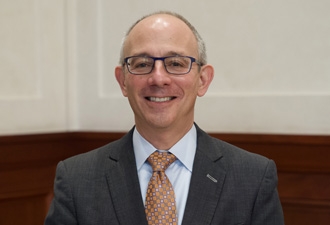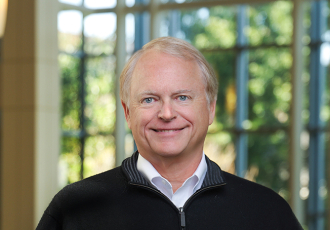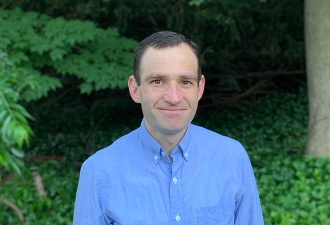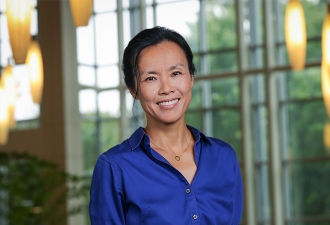Litigation and the Courts
Whether your aspiration is to be a legendary trial lawyer, a Supreme Court advocate, or even a judge, Duke Law School offers a multitude of opportunities to learn about litigation and the courts through both curricular and extracurricular activities.
At Duke, students take classes from leading scholars of judicial administration and the courts as well as legal practitioners with years of trial and appellate court experience. They also work in litigation-focused clinics, hold summer internships or semester-long externships with judges, prosecutors, and public defenders, and argue against their peers in moot court and mock trial competitions. As they approach graduation, and afterward, they get personalized support with applying for clerkships with judges at all levels, all the way up to the nation's highest court.
Duke also enjoys a uniquely strong connection to the judiciary through our Bolch Judicial Institute, which offers the only academic master’s program in the country designed for sitting judges. About 20 federal, state, and international judges come to campus each spring to participate in the two-year program, and many others come to campus to speak with students, take part in events, judge moot court competitions, and even teach classes.
Featured Faculty
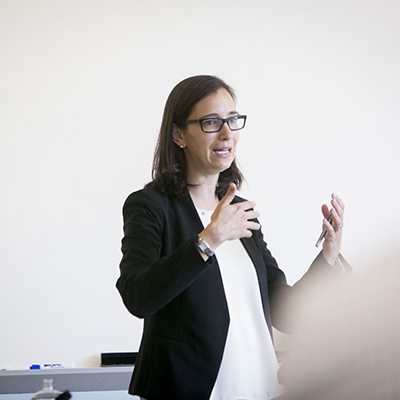
Marin K. Levy
Professor of Law
The national debate over court packing – adding or subtracting seats from a court to change its ideological composition – has brought attention to scholarship by Professor Marin Levy examining the practice at the state level. In an article in the William & Mary Law Review, Levy found that, contrary to long-held assumptions, court packing is indeed occurring in the states, and attempts to do so have been increasing, with the introduction of more than 20 different bills to change the size of the highest court in 11 states in the past decade alone. Levy, whose academic interests include judicial administration and federal courts, is director of Duke’s Program in Public Law, faculty advisor to the Bolch Judicial Institute, and a recipient of the Law School’s Distinguished Teaching Award.
More Faculty
Selected Courses
313 Judicial Decision-Making
What decides legal cases? One obvious answer is: the law. Judges apply the law to the facts of a case and an answer presents itself. This simple understanding of how law and the judicial process work may be true in many cases, but it is not true in all of them. Social scientists have sought to explain judicial decisionmaking by reference to a variety of non-legal factors, including judges' personal characteristics, their caseloads, and their relationships with each other. The social scientific study of courts raises a host of interesting questions.
For example, on a multi-member court like the Supreme Court, does it matter which Justice is assigned to write the opinion, or will the majority (or the whole Court) bargain to the same outcome anyway? If opinion assignment matters to outcomes, how might judges' choices about the division of labor influence the content of the law? How do higher courts ensure that lower courts comply with their decisions? Does the need to police lower courts alter legal doctrine, giving us more bright line rules and fewer fuzzy standards? Similarly, does the fact that certain groups, like the Chamber of Commerce, are repeat players, affect the outcome of cases? Does it affect doctrine? Finally, does it matter who is under the robes? Does the ideology of the judge, or her race or gender, matter to the outcome of cases? (Which cases?) If so, is it possible to predict how judicial characteristics will shape the law? Should our answers to these questions affect how we choose judges?
This course that will examine these questions and many like them. In law schools, these sorts of questions get limited attention: our focus is primarily on the legal doctrine or rules themselves. Social scientists take a very different approach, studying the behavior of judges rather than legal doctrine and trying to understand what accounts for judicial outcomes and the shape of legal institutions. This course will marry the social science literature and the questions it raises to a set of normative problems within the law itself.
315 Complex Civil Litigation
This is an advanced civil procedure class taught by a former big case litigator in the Moot Courtroom (for half the classes) and via Zoom (for half the classes) for those interested in large scale litigation, with an emphasis on practical application and stand-up courtroom (and Zoom) 3-minute "mini- oral arguments" on many of the key cases so as to better begin to prepare students for real-world case advocacy. The course will focus on the problems of large multi-party and multi-forum civil cases and how courts and litigants deal with them. Coverage will include the practical steps litigators need to take as well as decision points at the outset of litigation, joinder devices, especially (but not only) class actions; federal multi-district transfer and consolidation; litigation over the appropriate federal or state forum, coordination among counsel in multi-party cases, ethical issues, big-case discovery problems; ad hoc federal-state litigation coordination; judicial case management techniques and issues; and ways of accelerating or terminating potentially or actually protracted cases, including settlement, alternative dispute resolution, representative trials, mini-trials and claims processing facilities.
342 Federal Courts
The course considers the structure and powers of the federal courts and their relationship to the political branches and the state courts. The topics covered include justiciability, congressional authority to define and limit federal court jurisdiction, federal common law and implied rights of action, the application of state law in federal courts under the Erie doctrine, civil rights actions and immunities of state officials and governments, and habeas corpus. The focus of the course is on structural constitutional considerations relating to both the separation of powers between the three branches of the national government as well as the federalism relationship between the national government and the state governments.
420 Trial Practice
This is the basic trial skills course covering Opening Statement, Direct Examination, Cross Examination, Impeachment, Exhibits, Expert Witnesses and Closing Argument. In sections of 12 students per section, students prepare and perform the various skills using simulated problems and case files. After each performance, students receive constructive comments from faculty members who are also experienced trial lawyers. Students also get videotapes of their performances. The course ends with a full jury trial of a civil or criminal case with teams of two students on each side. At the end of the trial, the jury deliberates and students are able to watch the jury as it deliberates.
789 Writing: Federal Litigation
Persuasive writing is integral to almost all aspects of civil litigation. This two-credit hour advanced experiential course will allow you to deepen your understanding of legal research while honing your written and oral advocacy skills. Using a simulated case, you will plan litigation strategy by interviewing a client, preparing a factual chronology of the case, and analyzing the merits of the claims. You will also practice drafting and responding to discovery requests and preparing to take and defend depositions. Finally, you will draft a motion for summary judgment and supporting memorandum of law and argue the merits of the motion in a mock oral argument.
313 Judicial Decision-Making
What decides legal cases? One obvious answer is: the law. Judges apply the law to the facts of a case and an answer presents itself. This simple understanding of how law and the judicial process work may be true in many cases, but it is not true in all of them. Social scientists have sought to explain judicial decisionmaking by reference to a variety of non-legal factors, including judges' personal characteristics, their caseloads, and their relationships with each other. The social scientific study of courts raises a host of interesting questions.
For example, on a multi-member court like the Supreme Court, does it matter which Justice is assigned to write the opinion, or will the majority (or the whole Court) bargain to the same outcome anyway? If opinion assignment matters to outcomes, how might judges' choices about the division of labor influence the content of the law? How do higher courts ensure that lower courts comply with their decisions? Does the need to police lower courts alter legal doctrine, giving us more bright line rules and fewer fuzzy standards? Similarly, does the fact that certain groups, like the Chamber of Commerce, are repeat players, affect the outcome of cases? Does it affect doctrine? Finally, does it matter who is under the robes? Does the ideology of the judge, or her race or gender, matter to the outcome of cases? (Which cases?) If so, is it possible to predict how judicial characteristics will shape the law? Should our answers to these questions affect how we choose judges?
This course that will examine these questions and many like them. In law schools, these sorts of questions get limited attention: our focus is primarily on the legal doctrine or rules themselves. Social scientists take a very different approach, studying the behavior of judges rather than legal doctrine and trying to understand what accounts for judicial outcomes and the shape of legal institutions. This course will marry the social science literature and the questions it raises to a set of normative problems within the law itself.
315 Complex Civil Litigation
This is an advanced civil procedure class taught by a former big case litigator in the Moot Courtroom (for half the classes) and via Zoom (for half the classes) for those interested in large scale litigation, with an emphasis on practical application and stand-up courtroom (and Zoom) 3-minute "mini- oral arguments" on many of the key cases so as to better begin to prepare students for real-world case advocacy. The course will focus on the problems of large multi-party and multi-forum civil cases and how courts and litigants deal with them. Coverage will include the practical steps litigators need to take as well as decision points at the outset of litigation, joinder devices, especially (but not only) class actions; federal multi-district transfer and consolidation; litigation over the appropriate federal or state forum, coordination among counsel in multi-party cases, ethical issues, big-case discovery problems; ad hoc federal-state litigation coordination; judicial case management techniques and issues; and ways of accelerating or terminating potentially or actually protracted cases, including settlement, alternative dispute resolution, representative trials, mini-trials and claims processing facilities.
342 Federal Courts
The course considers the structure and powers of the federal courts and their relationship to the political branches and the state courts. The topics covered include justiciability, congressional authority to define and limit federal court jurisdiction, federal common law and implied rights of action, the application of state law in federal courts under the Erie doctrine, civil rights actions and immunities of state officials and governments, and habeas corpus. The focus of the course is on structural constitutional considerations relating to both the separation of powers between the three branches of the national government as well as the federalism relationship between the national government and the state governments.
420 Trial Practice
This is the basic trial skills course covering Opening Statement, Direct Examination, Cross Examination, Impeachment, Exhibits, Expert Witnesses and Closing Argument. In sections of 12 students per section, students prepare and perform the various skills using simulated problems and case files. After each performance, students receive constructive comments from faculty members who are also experienced trial lawyers. Students also get videotapes of their performances. The course ends with a full jury trial of a civil or criminal case with teams of two students on each side. At the end of the trial, the jury deliberates and students are able to watch the jury as it deliberates.
789 Writing: Federal Litigation
Persuasive writing is integral to almost all aspects of civil litigation. This two-credit hour advanced experiential course will allow you to deepen your understanding of legal research while honing your written and oral advocacy skills. Using a simulated case, you will plan litigation strategy by interviewing a client, preparing a factual chronology of the case, and analyzing the merits of the claims. You will also practice drafting and responding to discovery requests and preparing to take and defend depositions. Finally, you will draft a motion for summary judgment and supporting memorandum of law and argue the merits of the motion in a mock oral argument.
Civil Justice Clinic
The Civil Justice Clinic is a unique partnership between Duke Law and Legal Aid of North Carolina in which students work on cases relating to housing, benefits, and protection from domestic violence, among others. Working under the supervision of clinic faculty and staff attorneys in Legal Aid's Durham office, students directly represent clients in matters that include actions arising from unsafe housing, landlord-tenant disputes, foreclosures, incidents of domestic violence, and unemployment and food stamp benefit claims.
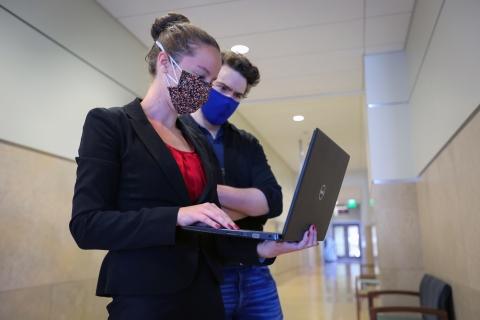
Appellate Litigation Clinic
The Appellate Litigation Clinic enables students to develop litigation skills by working on federal appeals. The clinic’s supervising attorney accepts appointments from federal appellate courts in appropriate appeals where parties lack representation. In such cases, students work in teams; they review the record, conduct legal research, draft and edit opening and reply briefs, prepare the excerpts of record for the court of appeals, and help prepare for oral argument.
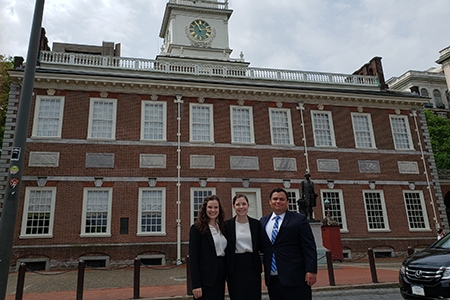
Meet Meredith Criner '22
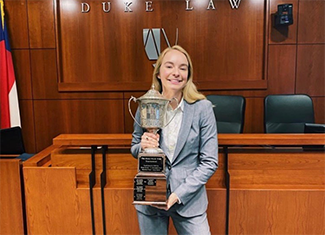
At Duke, Meredith has been a research assistant for the Bolch Judicial Institute and a student editor for Judicature and had an externship with the chief justice of the North Carolina Supreme Court. She was a quarter-finalist in the Hardt Cup moot court competition and won the Twiggs-Beskind Cup mock trial competition, and she spent her summers in Washington, D.C., working on litigation matters at the Institute for Justice and Paul Hastings. After graduation, she clerked for Judge James C. Dever III of the U.S. District Court for the Eastern District of North Carolina and is currently clerking for Judge Michael B. Brennan of the U.S. Court of Appeals for the Seventh Circuit.


